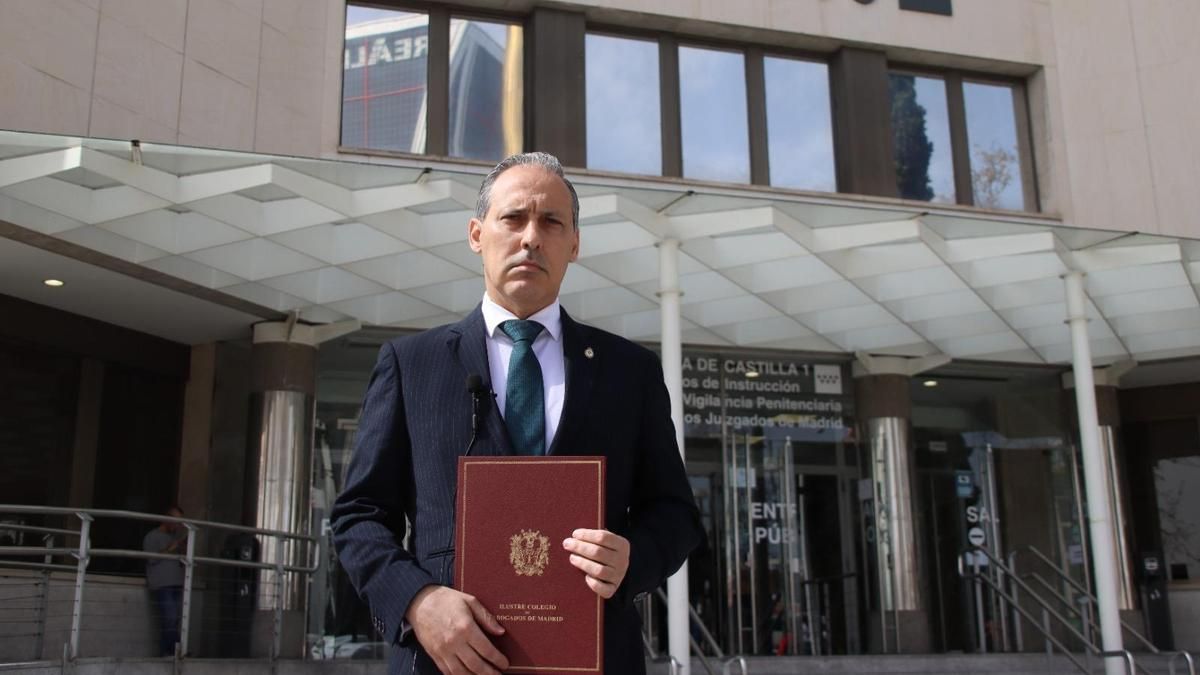The dean of the Madrid legal profession was the first to go to court to report that the Prosecutor's Office had revealed details of the confession of tax fraud by Isabel Díaz Ayuso's partner. Since then, the Illustrious Bar Association of Madrid (ICAM) and its leader Eugenio Ribón have become two of the protagonists of the case for which the attorney general will be tried in a few weeks: he asks for four years in prison for Álvaro García Ortiz and has maintained for more than a year that the leak torpedoed the agreements that, day after day, lawyers and prosecutors sign in the courts and tribunals of Madrid.
Ribón's testimony before Judge Ángel Hurtado last February became a direct confrontation with the State Attorney's Office, which tried without success to expose that, in reality, the agreements continued to be held normally in Madrid despite what the ICAM claims.
The Madrid legal profession was the first to target the Prosecutor's Office when, on the morning of March 14, 2024, the Public Ministry issued a statement to deny the false information that Miguel Ángel Rodríguez and several media outlets had spread about the case of Alberto González Amador: that the Prosecutor's Office had offered him a pact, but had withdrawn it on orders from the organization's leadership. “The ICAM considers the disclosure of data to be extremely serious,” he quickly said about that statement, with Ribón personally presenting the complaint in court six days later. One day before González Amador himself.

Those first complaints were not focused, as the Supreme Court does now, on the leak of the email to the media, but on the Prosecutor's Office statement on the case, something that has changed to the point that the Supreme Court has ruled out that there was a crime in that press release. And in addition to opening criminal proceedings against the Prosecutor's Office, the ICAM also disassociated itself from the conformity protocol, denouncing that the secrecy of the communications of the Madrid lawyers “doesn't seem to be guaranteed”.
Ribón was called to testify by Judge Hurtado in the Supreme Court in a dual capacity as a witness and also an expert, according to the magistrate himself. Witness, because those days he held conversations and meetings with the leadership of the Prosecutor's Office to ask for explanations for the statement, but also an expert to explain how the leak had negatively affected the legal profession as a whole and not only the case of González Amador due to his disassociation from the protocol and his own platform.
This point was one of the most tense of his appearance when the State Attorney who was then defending the prosecutor Pilar Rodríguez asked about this impact on conformities. “Do you know if since March 18 the compliances in Madrid have been affected?” asked Rodríguez's representative, to which Ribón answered emphatically: “Of course they have been affected.” Hurtado cut off the questions that asked the dean for the specific data that supported his statement: “It is unrequired for him to tell us specific data (…) I don't want to get into a debate.” “That categorical statement is uncertain, it is unconscious on your part if you have not come with data to affirm it,” stated the State lawyer before being forced to change the subject.
A decrease of 8.4%
The Madrid Prosecutor's Office denies Ribón's statement in its latest report relating to 2024, a document already presented weeks ago by the Madrid Public Ministry that includes several allusions to this case and, among other things, to how the conformities were affected. In 2024 there were a total of 564 compliance agreements, which according to the Prosecutor's Office represents “a decrease of 8.4%” compared to 2023.
Despite the “unilateral” suspension of ICAM and its computer platform to facilitate compliance, the Prosecutor's Office said in its report, “the lawyers continued to contact the Prosecutor's Office in order to make an appointment with the intention of reaching an agreement before the trial.” The solution was to enable new email accounts for each section of the Prosecutor's Office and designate coordinating prosecutors. The decline, more pronounced in criminal courts, is attributed to the two months it took for lawyers to use the new system.
Ribón will testify again in the trial that will be held between the 3rd and 13th of next November in the Supreme Court with García Ortiz's defense and the Prosecutor's Office convinced that the dean of ICAM promoted the initial complaint alleging non-existent damage to the legal profession as a whole. The slight decrease in conformities has been caused, in any case, by his unilateral decision to disassociate himself from the conformity protocol that González Amador's lawyer and prosecutor Julián Salto, in addition, were not using when talking about a possible pact.
Another part of the confrontation moved to when the State Attorney wanted Ribón to develop another of the shared complaints of the ICAM and the partner of Isabel Díaz Ayuso: if his possibility of defending himself had disappeared after it became public that he had been willing to recognize his tax fraud of 350,000 euros and make an agreement. Ribón compared it to a fictitious example of a person accused of drunk driving whose lawyer admits that he drank “12 cigars”: “The defense scenario is no longer the same, the defense strategy is absolutely compromised.” “In one way or another it can be contaminated,” he had stated minutes before.
“Are you then questioning the impartiality of a judge?” asked the State Attorney before being cut short by Judge Hurtado while Ribón categorically denied.